71% of businesses contract some accounting and finance needs to outside firms—is it the best option for your business?
There's been an exodus of accountants and auditors over the past two years—the Bureau of Labor and Statistics reports that more than 300,000 professionals have left the field and this trend shows no signs of stopping[1]. As a result, accounting firms are short on staff. They have been hamstrung on services they can provide and this has created significant challenges for businesses seeking outside accounting help.
Capterra’s 2023 Accounting Shortage Survey* of 297 business leaders found that 64% of organizations are struggling to find outside accounting firms that can support them. And to avoid delaying accounting tasks, more than half have adopted software.
From rising costs to difficulties finding a firm with the expertise you need during tax season, your business has likely already felt the effects of America’s accounting shortage.These hurdles might leave you wondering if outsourcing is still the right path forward for you—thankfully, looking at how other small and midsize businesses (SMBs) are navigating the shortage can help you tackle this decision.
Not only will we cover the top services businesses commonly outsource and the challenges they face, we’ll dive into the technology they use to combat delays and explore how developing their internal teams have equipped organizations with the expertise they need.
/ Key findings
Businesses turn to accounting firms for expertise and support: 71% of organizations outsource some amount of their accounting needs and 65% of businesses require full-time support from firms to handle tax compliance and other complex tasks.
Businesses are seeing new challenges when outsourcing accounting: Rising costs (50%) and an inability to support requests (31%) are among the moderate or significant challenges 64% of organizations report facing when finding a firm to support their needs.
Delays have businesses looking elsewhere for support: 93% of businesses have had to delay accounting tasks due to issues with their service provider and 52% of organizations are turning to software as a solution.
Businesses that don’t outsource invest internally to meet their needs: 62% of organizations that refrain from outsourcing feel confident in their teams' ability to meet their financial needs; they're ensuring this by developing their departments through certification assistance (32%) and other support methods.
What’s causing America’s accounting shortage?
Several overlapping factors have created a shortage of accounting talent. The American Institute of Certified Public Accountants (AICPA) reports that the CPA pipeline is the weakest it’s been since 2010 and that 75% of today’s public accountants will retire within the next 15 years[2]. Combined with the Great Resignation—where millions of professionals across industries left their jobs—this lack of talent also leads to a lack of expertise as tenured accountants depart the field.
Outsourced accounting services are in high demand
Accounting firms provide a wide array of services for businesses and more than two-thirds (71%) of organizations outsource to handle some portion of their accounting and finance needs. While almost every firm offers common services such as bookkeeping or payroll processing, not every firm boasts the skills of a certified public accountant (CPA), or the ability to provide advisory services.
Overall, a majority of businesses (65%) say they look for full-time support from firms, especially when it comes to outsourcing time-intensive tasks or when specialized expertise is needed—navigating the complicated tax compliance process (48%) and audit outsourcing (50%) are two of the top services. Out of all the outsourcing options, businesses turn to firms for financial advisory services (54%) the most.
Along with strong time management skills (50%), respondents prize qualities such as being detail-oriented (41%) and adaptable (33%) when looking for a firm. Frequent and concise communication (45%) is another desired skill, which is more important than ever in an increasingly remote work environment and given the fact that businesses need to keep financial records updated monthly, if not more frequently.
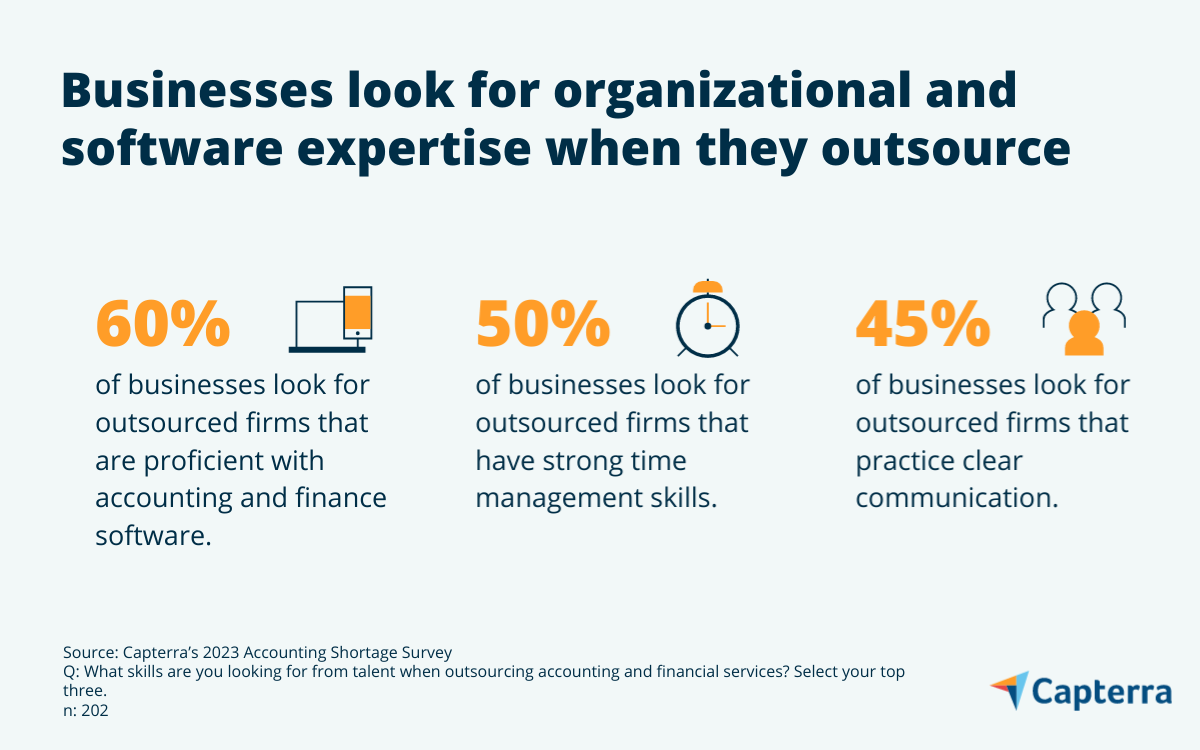
If you have a limited accounting department helmed by a lone CPA, outsourcing can provide them with the ability to lean more into a strategic role while firms tackle compliance work and day-to-day tasks. Outsourcing can also provide relief if you’ve experienced unexpected turnover or struggle to find fresh talent, as firms provide expedient support that can free up time and resources that were otherwise devoted to recruiting and onboarding.
If outsourcing feels like the right step for your business, keep in mind that the benefits it affords come with trade-offs—here are a few things to consider before you contract out:
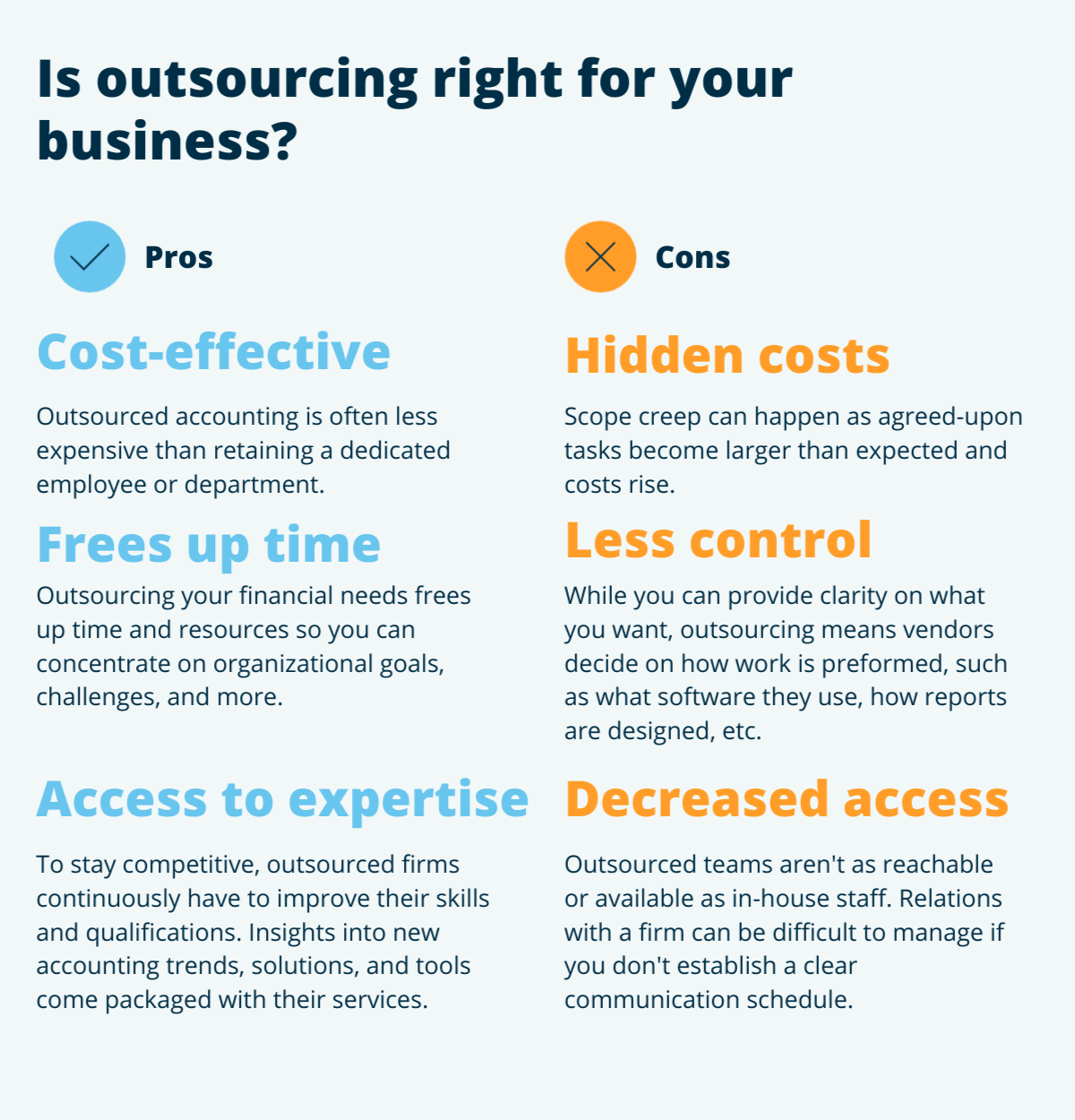
Ready to hire an accounting firm for your business needs? Browse Capterra's list of top accounting firms and learn more about the hiring process in our hiring guide.
Rising costs and a shortage of services make outsourcing difficult for SMBs
America’s accountant shortage has limited the services firms can provide. For example, turnover has left some unable to tackle preparing tax returns, and, in other cases, the inability to staff projects has seen others stop performing audits altogether[3]. And businesses have felt the ripple effect—64% of surveyed businesses report moderate or significant challenges finding an outside provider to support their needs.
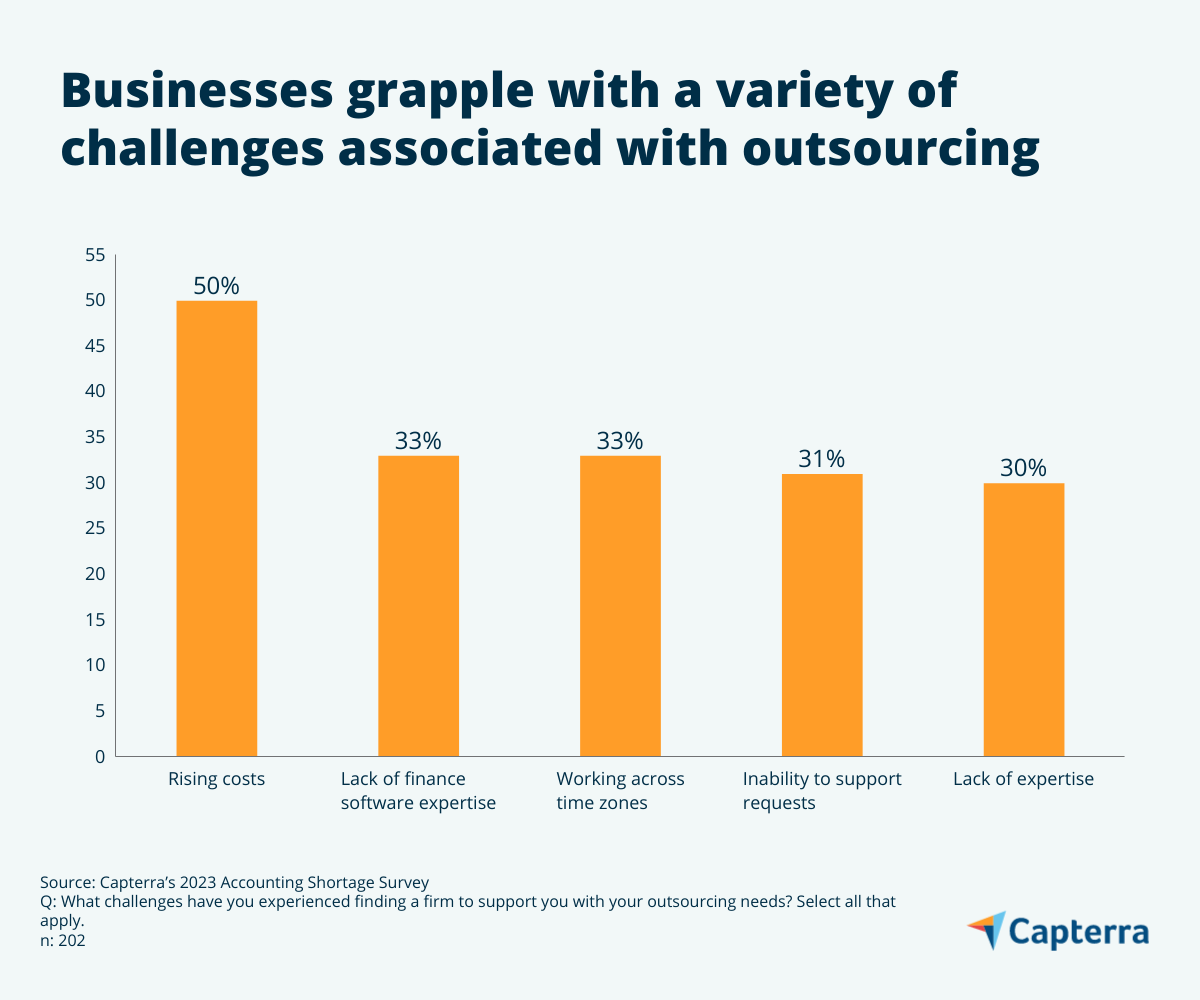
With many businesses looking for help with tax compliance and audits, firms' lack of expertise (30%) and their inability to to support requests (31%) proved pressing concerns. However, respondents say their biggest challenge is rising costs (50%). Firms have increased prices to compensate for heavier workloads and new regulations. An audit, for instance, used to cost $3,000, and now, it can be as high as $15,000[2].
To save money and prepare for tax season, some providers have outsourced basic, entry-level work overseas. These teams use basic accounting software to prepare financial statements or attend to tasks like data entry. However, businesses report that working across timezones (33%) is one of the toughest challenges they encounter when outsourcing, which, in part, has to deal with the level of communication an accounting firm can provide.
As businesses encounter delays with outsourcing, some look to software and in-house teams
Even with full-time outside support, only 7% of businesses say that they have not had to delay any accounting tasks this year due to issues with their service provider.
Highly specialized tasks, such as conducting an internal audit (17%) or forensic accounting (21%), were the least affected. More comprehensive and routine needs, such as accounts receivable/payable management (32%) and tax reporting and filing (30%), were the most affected.
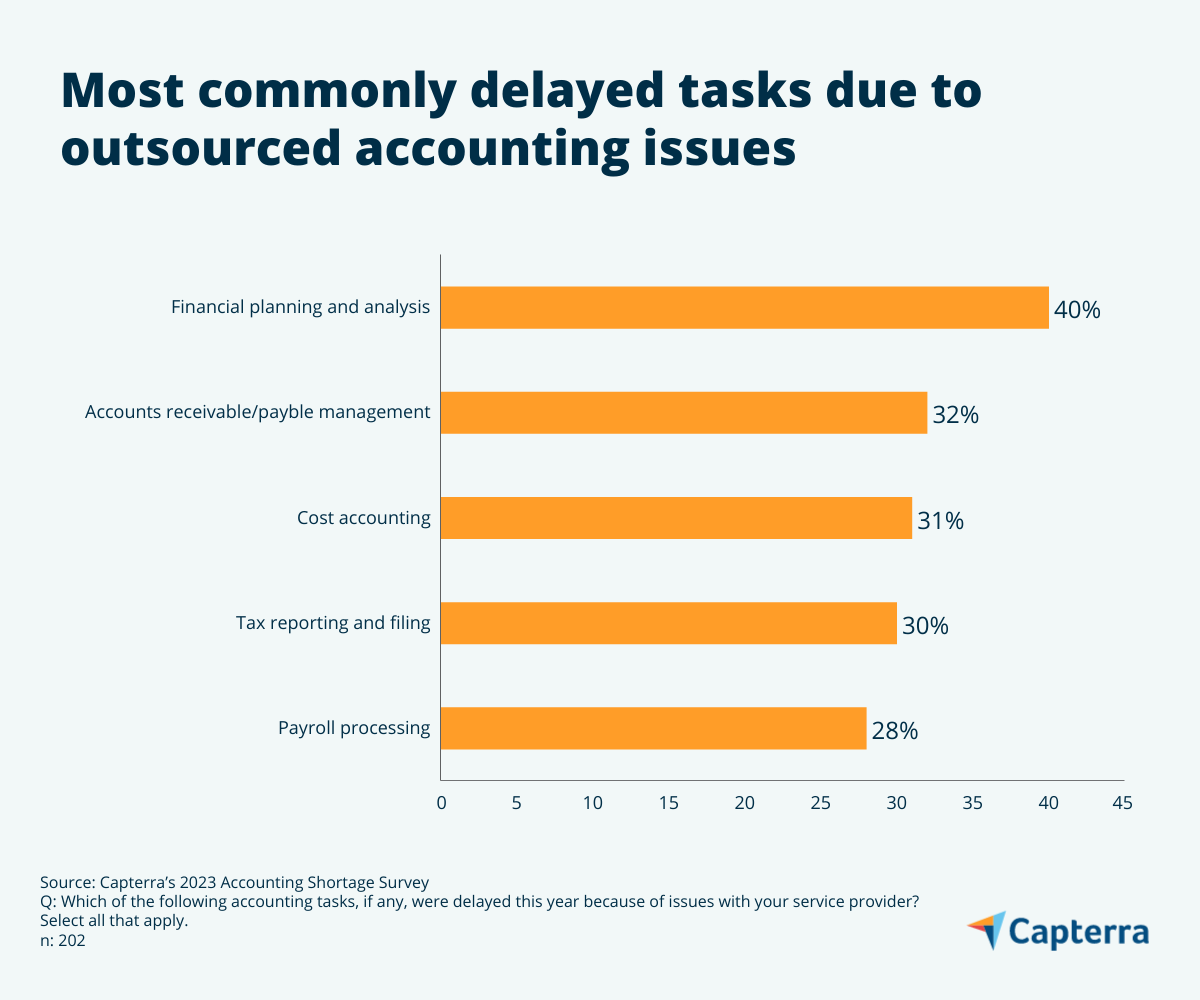
Businesses reacted differently to ensure that critical accounting tasks were completed correctly on time. A minority asked for a tax extension (21%) and continued working with their outsourced partner. Others turned outward and found another accounting service (39%) that was better equipped to meet their needs.
The majority of businesses, however, remedied the problem by turning inward—52% of respondents adopted software as a solution, and though technology will never replace accountants entirely, it’s becoming more and more viable as the industry explores its application to everything from payroll processing to financial planning and beyond.
Software serves as a solution for outsourced service shortcomings
Like outsourcing assistance, adopting accounting software is a way to save money, free up time, and improve an organization’s financial decision-making. The appeal of this technology isn’t lost on businesses—in the next year, 58% of respondents plan to spend more than $10K on new accounting software alone.
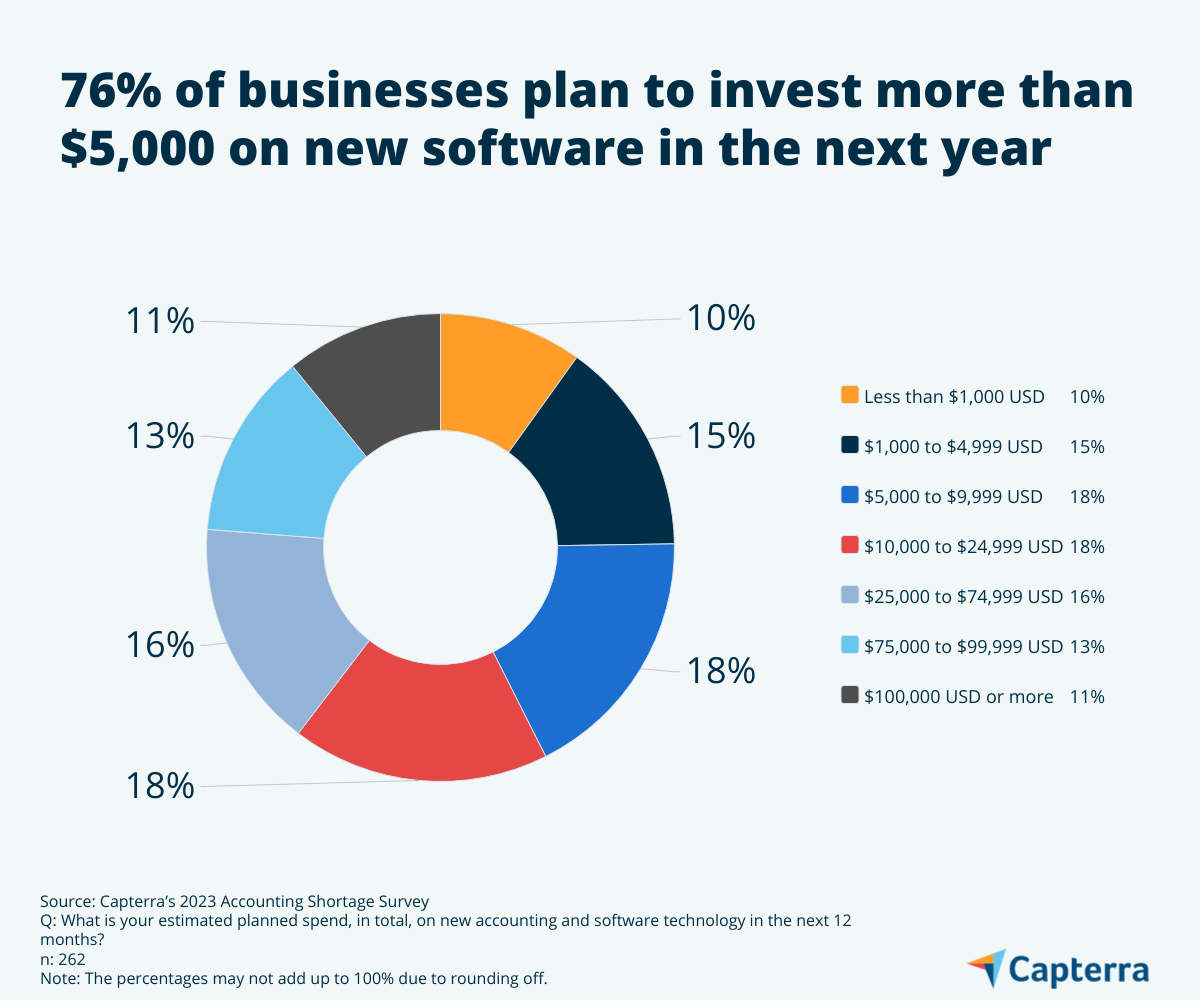
Below are the top three technologies businesses say they plan to adopt in the next two years:
Billing and invoicing software
In its most basic form, billing and invoicing software (46%) simplifies the tedious task of juggling invoices by condensing the process through automation. However, this is just the tip of the iceberg: Some applications can track time and expenses while others let businesses design customizable invoices to enhance branding.
Budgeting and forecasting software
Budgeting and forecasting software (42%) gives businesses new ways to track and manage annual budgets while also shortening the process by focusing collaboration through one single tool. Collected data can be used to plan for “what-if” scenarios and to make predictions on where a business is headed, all of which can be displayed through easily created charts and graphs.
Accounts payable and receivable software
Accounts payable and receivable software (41%) can help cut down on errors in this process. Software streamlines these activities, consolidates important data, and offers real-time reporting so you have a better understanding of your cash collection and payment processes.
Internal investments offer an alternative to outsourced assistance
Software isn't the only alternative to outsourcing. In fact, 62% of businesses that refrain from outsourcing feel completely confident that their in-house teams can handle all of their accounting-related tasks this year.
What stopped these organizations from outsourcing in the first place? Major detractors include cost (59%) alongside the feeling that accounting firms lack the industry-specific expertise (26%) or technical skills (18%) needed to provide support.
To ensure their accounting department has the necessary skills to meet all their requirements, organizations continuously develop their teams’ expertise in a handful of ways.
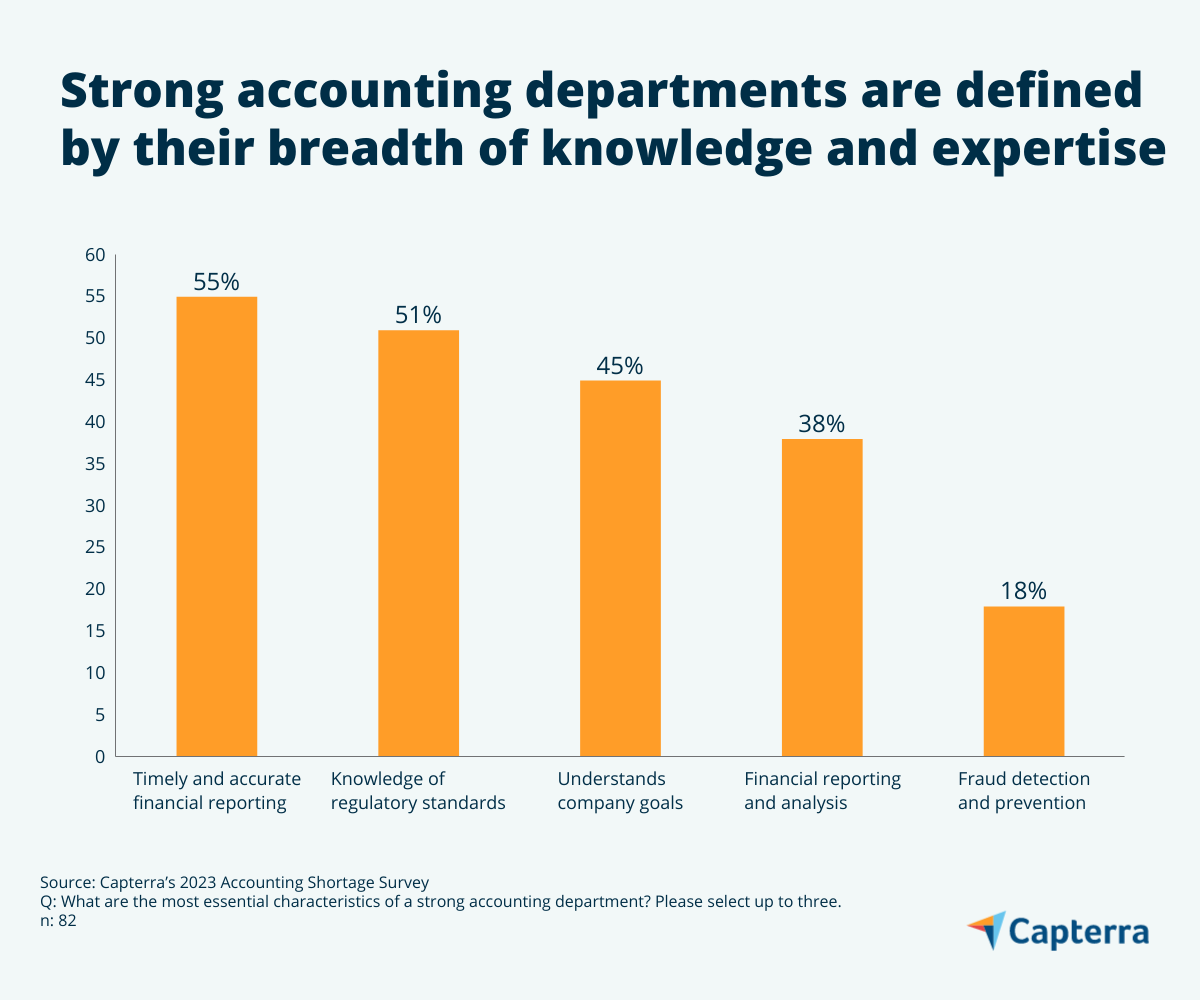
Beyond conducting in-house training (57%) and giving employees access to continuous educational development (37%), businesses say the most advantageous investment they made in their accountants is through certification assistance (52%).
The skillsets of a certified public accountant (CPA) or a certified management accountant (CMA) don’t come easy, as both require individuals to pass rigorous exams, but each of these licenses are the most renowned within the field and equip your team with the ability to handle specialized functions.
For instance, a CPA can ensure companies comply with bylaws and regulations, handle conducting an audit, run fraud examinations, and more. A CMA can use their expertise in budgeting and forecasting, performance management, and financial analysis to help handle the financial planning process or to optimize the financial reporting process.
As opposed to indefinitely outsourcing services, bolstering your internal team’s capabilities can also be coupled with adopting software. In the long-run, these solutions can provide the efficiency and expertise accounting firms bring to the table while also being cost-effective.
Outsourcing can be a valuable resource but there are plenty of other options
The accountant shortage has made it difficult for firms to provide the services businesses yearn for. Depending on your needs, some of these tasks can be supplemented by software or you can strengthen your internal expertise through training and more.
Good places to start if technology has piqued your interest include exploring what free financial software is available, some ways you can automate essential accounting tasks, and how other businesses are already using artificial intelligence and machine learning to improve how they approach financial decision-making.
If outsourcing still feels right for your business, here are some things to consider when choosing the perfect firm for you:
Qualifications: Some financial services require the skills of a CPA. For instance, only a CPA can defend a tax return if the IRS or authorities have questions or concerns. An accountant, however, can organize and record financial transactions and is qualified to manage a variety of day-to-day tasks. Be sure that the qualifications of your outsourced talent match your business's needs.
Fees: Rates from one firm vary to another. Some firms charge by the hour, others require a retainer for advisory services, while others charge by the task. Be on the lookout for firms that package advisory and compliance services, but above all, before you enter into a partnership, be crystal clear on how charges are billed and the cost.
Availability: Create a clear communication plan with your partner that establishes how you converse, how much you keep in touch, and what expectations are if something arises. If you’re in the initial process and communication is slow or there is a habit of delays, it might be better to find a firm that makes you a priority.
Dive into our state of the accounting industry report to see what other technology and trends will define 2023. From tech stack optimization to the power of automation, there’s sure to be something that will capture your interest.

